Article 101: Immanuel Kant and the aspiration to establish the supreme ethical principles
Coffee was the daily companion energy of the philosopher Immanuel Kant in his journey to create doctrines that illuminate the nature of the human being and guide people towards a life of happiness.
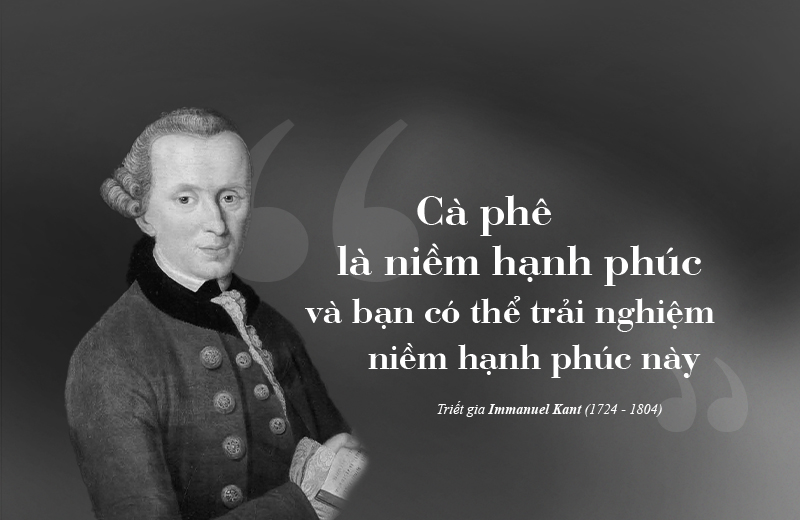
Coffee is happiness and you can experience this happiness” – Philosopher Immanuel Kant (1724 – 1804)
Philosophy for Humanity and of Humanity
The 17th-18th centuries were seen as the Age of Enlightenment, a revolution of thought in Europe and North America. This was an era when human reason was maximized to expand knowledge, maintain individual freedoms, and ensure happiness. Humans have proven their capacity to transform reality, to reach a better life as a multitude of economic, technological, and scientific achievements blossomed.
Particularly, the optimism about a better world, combined with the powerful development of critical thinking, has driven thinkers and philosophers to continuously raise questions, challenge accepted beliefs, and debate each other’s viewpoints. The aim was to address age-old issues about lifestyles, ethics, and human happiness, with the common goal of building a better life.
Among them, the German philosopher Immanuel Kant (1724-1804) is considered one of the 10 most important Enlightenment thinkers who took Western philosophy to new heights. With his monumental philosophical system that studied humans as both cognitive and moral agents, Immanuel Kant’s ethical perspectives were oriented towards the common values of humanity, embodying the human aspiration towards goodness and happiness for each individual.
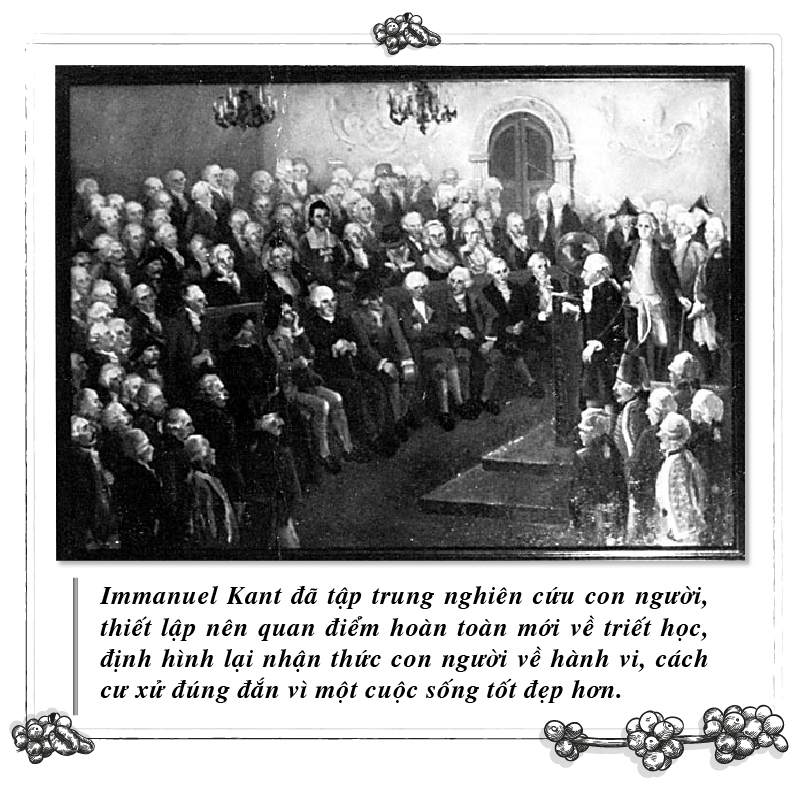
Immanuel Kant focused his research on the study of the human being, establishing a completely new philosophical perspective that redefined human understanding of behavior and the proper way of conducting oneself for a better quality of life.
Hailing from a devout family, Immanuel Kant received his early education from ministers. At the age of 16, he entered the University of Königsberg as a theology student and even delivered lectures on special occasions. However, as he matured during the period of rapid development in natural science and the understanding of nature and humanity, he became drawn to physics and mathematics. Immanuel Kant began to study the works of philosophers such as Gottfried Wilhelm Leibniz (1646-1716), Christian Wolff (1679-1754), and Isaac Newton (1643-1727), and completed his first work at the age of 23.
After some family upheavals, Immanuel Kant resolved to pursue an academic career and became a university lecturer. In this role, he not only taught but also continued his research and writing of essays on topics in natural science. With an unwavering spirit of advancement, Kant took on teaching duties in various subjects beyond mathematics and physics, including geography, metaphysics, and moral philosophy, attracting a large student body including scholars.
Notably, from 1770 onwards, Immanuel Kant devoted all his time and effort to research. The result after 11 years was the creation of a series of great works: Critique of Pure Reason (1781), Critique of Practical Reason (1788), Critique of Judgment (1790) … These expressed Kant’s philosophical perspective on the three fundamental aspects of the human being: the human in relation to nature; the human in relation to other humans and society; the human in relation to oneself.
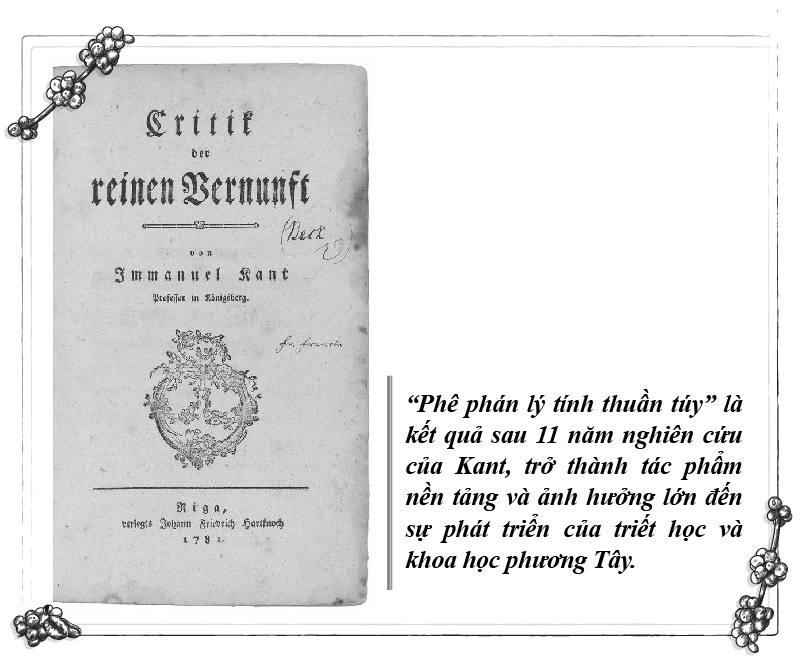
“Kritik der reinen Vernunft” (Critique of Pure Reason) was the result of Kant’s 11 years of research, becoming a foundational work that had a major influence on the development of Western philosophy and science.
The moral law aims towards goodness and happiness
Influenced by the intellectual thinking of the Enlightenment era, Immanuel Kant recognized that a thinker must make a breakthrough in using the scientific method, not only to discover new things about the material world, but also to improve human life and social organization. At the same time, he affirmed that the important purpose of philosophy is about the human condition, and the philosophy of the human condition is the issue of ethics. Therefore, Kant made the human being the central focus of his research, and his ethical doctrine always refers to the value of the individual and humanity.
Kant had the aspiration to build a supreme ethical principle of absolute nature, based on reason and detached from emotionality, personal gain, and oriented towards the beautiful world that he called the “world of angels”. He studied the history of human thought from ancient to modern times in a critical spirit and developed his own ethical structure in three works: Groundwork of the Metaphysics of Morals (1785), Critique of Practical Reason (1788) and The Metaphysics of Morals (1797).
Accordingly, Kant introduced an entirely new concept that has had a profound impact on many fields today, known as the “categorical imperative”. The categorical imperative is regarded by Kant as the only and highest standard for assessing the moral behavior of human beings. It requires that every human action must consider others as an end in themselves, aiming toward positive values to improve life and bring happiness, rather than using others as a means to achieve one’s own personal happiness. People feel a duty and responsibility to do what is ‘right’ and follow ‘truth’, regardless of whether or not it benefits them.
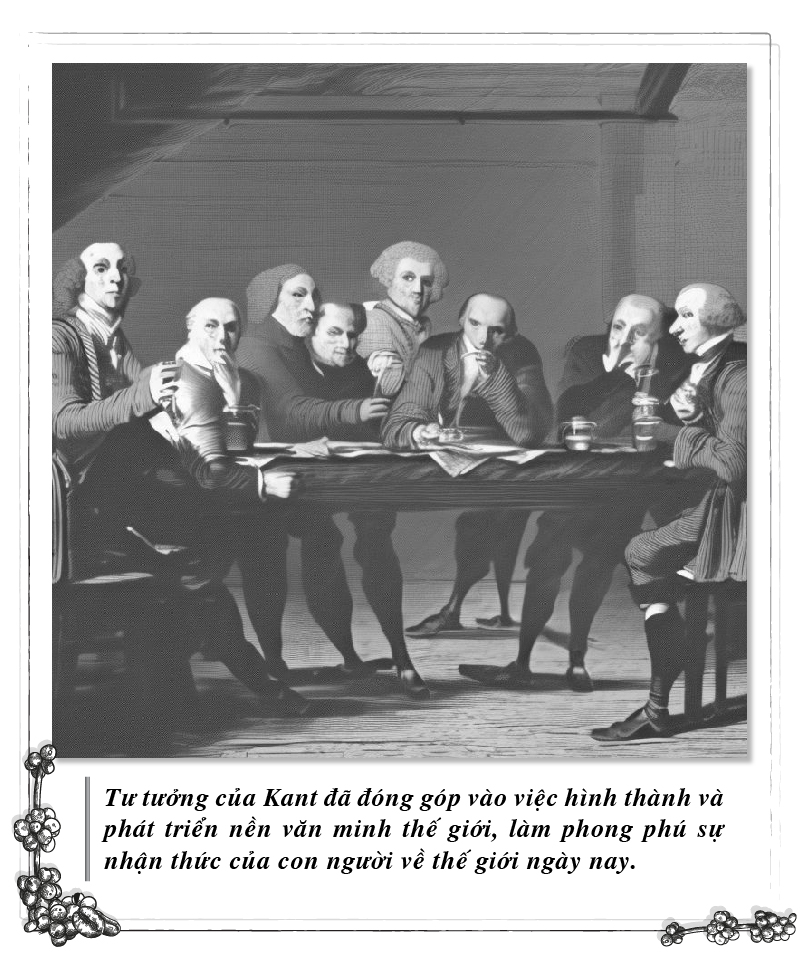
Kant’s thought has contributed to the formation and development of world civilization, enriching human understanding of the world we live in today.
Kant’s ethical doctrine also has great practical value. Not only did he establish the connection between ethics and social issues such as the rule of law, religion, and history, but Kant also put forth a superior view of “freedom.” According to Kant, freedom is not the mere satisfaction of individual preferences, but must be linked to ethical principles, the law, and the individual’s responsibility to both self and community. Freedom demands that people continuously cultivate and train themselves according to ethical principles in order to be masters of themselves in any situation.
Kant’s theory of freedom has important significance in the education and development of human character. At the same time, Kant made a groundbreaking contribution by forecasting that in the future, human rights would become one of the crucial issues for humanity. Indeed, Kant’s ethics have been incorporated into the Universal Declaration of Human Rights (1948), the International Covenants on Political and Economic Rights (1966), and the International Criminal Court (2002).
Immanuel Kant not only discussed the relationship between the individual and the individual, the individual and the community, but also went further to address issues of universal human significance. While Kant’s ethical principles do not delve deeply into aspects of class and ethnicity, they emphasize universal values applicable to all of humanity, suitable for all nations and all eras. Particularly, Kant’s doctrine stands out with the idea of establishing a perpetual peace for humanity, a peace built on the basis of an alliance of nations. In his “Toward Perpetual Peace” (1795), Kant outlined the prerequisites for creating a lasting peace. At the time, this proposal was considered unrealistic, but in the 20th century, it received much attention and was seen as the precursor to the League of Nations and the United Nations.
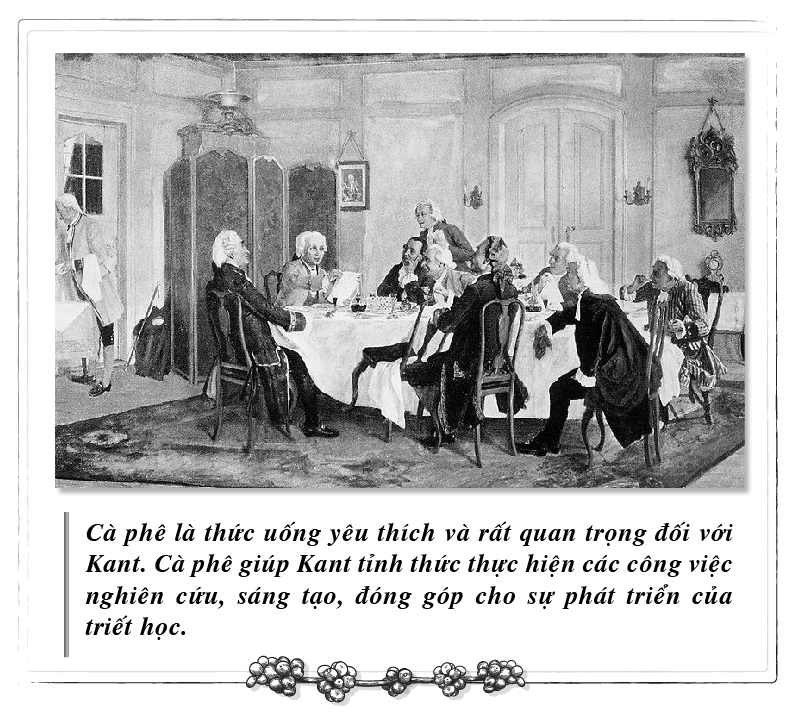
Coffee was a favorite and very important beverage for Kant. Coffee helped Kant stay alert and carry out his research, creative work, and contributions to the development of philosophy.
On the journey of establishing a universal ethical principle to guide humanity toward the highest good and a peaceful, happy way of living, coffee – the elixir that uplifts the intellect – was a constant companion of the Enlightenment thinkers and was always present alongside the philosopher Immanuel Kant. Enjoying coffee became an integral part of Kant’s fixed daily routine: waking up, drinking coffee, writing, lecturing, and taking walks.
Immanuel Kant was considered a philosopher with an orderly, regulated lifestyle, and he transformed the “definite uniformity” in his way of living from a simple habit into an ethical principle. Until the last days of his life, Kant remained devoted to the habit of enjoying coffee, often requesting that coffee be served to him “right on the spot.” In the work The Last Days of Immanuel Kant (1827), Thomas de Quincey described that drinking coffee was a very important daily pleasure for Kant, to the point that Kant had to make notes to remind coffee being served in upcoming appointments he would attend.
Immanuel Kant’s philosophy can be seen as a philosophy for and about humanity. Kant’s ethics were oriented toward universal human values, embodying humanity’s aspiration towards goodness and a happy life. At the same time, the presence of coffee throughout Kant’s great life and work helped recreate human consciousness and stimulate social progress, once again demonstrating coffee’s connection to humanity’s drive to transcend fate and seek happiness through its own philosophical thinking.
Readers are cordially invited to watch the series of The Tao of Coffee videos posted on https://bit.ly/caphetrietdao
Coming up: The mark of coffee in the historical development of music


